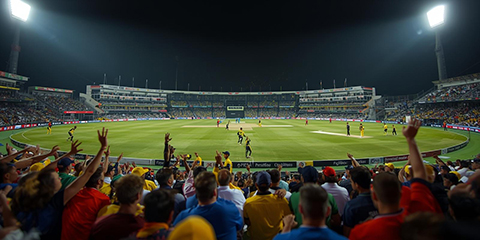Pakistan cricket's identity crisis: A legacy of mismanagement
JournalismPakistan.com | Published 10 months ago | Dr. Nauman Niaz (TI)
Join our WhatsApp channel
Pakistan cricket evolved from the unbridled passion of selfless individuals who desired to see their nation triumph. It was never a system, never a structured entity, it was a movement driven by nationalism and raw talent. The earliest stock of cricketers had been hardened in the Ranji Trophy and the Bombay Quadrangular, forging their skills in the passionate cauldron of pre-Partition Indian cricket. Some talent surfaced from Punjab University, but beyond that, Pakistan had to develop its cricketers, relying on passion rather than infrastructure.
Yet, from its inception, Pakistan cricket found itself trapped in an identity crisis, confused and equally perplexed between imperial values and local dogma. Cricket was an amateur sport in a country where the military controlled most others. Brigadier Cuthbert Harold Boyd Rodham was the main man in shaping sports governance, while in cricket, it was Justice A.R. Cornelius, the first Vice President of the Board of Control for Cricket in Pakistan (BCCP), who played a pivotal role. But amateurism ran aimlessly.
First-class cricket never attracted sponsors, and even when departments were inducted, it did little to professionalize the game. Infrastructure merely meant stadiums, no pathways, no academies, no talent development. The custodians of the domestic game were clerks, groundsmen, and self-proclaimed cricketing ‘Chachas’ (selfless, erudite, and zillion a time better than so-called coaches we have) with no formal education or strategic vision.
Merit eroded. Corruption seeped in. Favoritism, regional biases, the infamous Karachi-Lahore divide, and the Sindh-Punjab ethnic fault lines, all corroded the sport from within. The administration of cricket fell into the hands of retired three-star generals, judges, bureaucrats, and air marshals, none of whom ever contemplated how professional cricketers would sustain themselves. The only exception was the visionary A.H. Kardar, who approached Bhai Mian, the President of the Banking Council, and convinced him to introduce departmental teams. This move, unique in world cricket, could have been refined, and regional teams could have been linked to banks, preserving local patriotism while ensuring financial sustainability.
Despite these systemic failures, Pakistan produced exceptional cricketers, many honed in English county cricket, a few in the Australian Sheffield Shield, and some in Kerry Packer’s World Series. They won matches, sometimes series, on sheer brilliance. But player pathways were never designed. Then came the broadcasters, the corporatization of cricket, and the advent of data-driven, process-oriented methods. While the world evolved, Pakistan remained shackled by its insecurities, its politics, and its obsession with self-interest. The PCB chairman’s post became a prize for political loyalty, and the board was filled with individuals who had no understanding of the game as an industry.
First-class cricket was maintained only to fulfill the ICC’s minimum requirements, exhausting through PKR 4 billion annually without any tangible output. Multidisciplinary approaches, fitness, biomechanics, kinesiology, injury prevention, and scientific development were dismissed as irrelevant. The same superstars who once brought glory, now tainted by corruption and self-interest, occupied key positions, juggling multiple jobs, enjoying financial perks, yet contributing nothing to cricket’s growth.
Now, even individual brilliance has faded. Pakistan cricket, its players, and its team have become completely irrelevant. The solutions are known but remain unwelcome in the corridors of power. The gatekeepers of the sport are satisfied with their privileges, their lack of accountability protecting them from the consequences of failure. The time for reform has long passed; what remains is the slow, painful realization that Pakistan cricket has been left behind, not by talent, but by a refusal to evolve.
The Crisis of Pakistan Cricket: A Struggle of Leadership, Bureaucracy, and Mediocrity
Pakistan cricket, once revered for its raw talent, flair, and unpredictable brilliance, now finds itself enmeshed in a quagmire of bureaucratic inertia, political interference, and mediocrity. The administration of the sport, led by former players with vested interests, has become a revolving door of individuals more interested in personal gains than in the sport’s progress. The focus has shifted away from merit, player development, and process-driven strategies, leaving Pakistan cricket to flounder in a sea of short-sightedness and mismanagement.
Bureaucratic Incompetence and Political Interference
The governance of Pakistan cricket is marred by inefficiency, with former players often filling positions not for their expertise or ability to execute but due to personal alliances and political connections. These individuals, more often than not, lack the vision and competence necessary to drive change. The true essence of leadership in sports is not just about holding a position but about delivering results, which is something that has been consistently lacking in the Pakistan Cricket Board (PCB).
This lack of leadership is compounded by a toxic cricket bureaucracy that operates more like a closed network than a transparent institution. The influence of political figures, who often use cricket as a vehicle for their agendas, has stunted the growth of the game. Decision-makers in positions of power are more focused on consolidating their power or pandering to their supporters than on making decisions that will benefit Pakistan cricket in the long term. The result is a disjointed cricketing ecosystem, with no clear direction or vision for the future.
A Ruined Domestic Structure
The foundation of any strong cricketing nation lies in its domestic structure, but Pakistan’s First-Class cricket is in disarray. The domestic system has been undermined by poor management, a lack of investment, and a focus on short-term gains rather than long-term development. The quality of cricket played in the domestic league is far from what is required to produce players capable of competing at the international level.
The absence of a clear focus on process-driven development, including data analytics, biomechanics, injury prevention, and AI-driven insights, has left Pakistan’s cricketers woefully underprepared. Modern cricket demands more than just raw talent, it requires players to be finely tuned athletes, with a deep understanding of their bodies and the game’s tactical nuances. However, these concepts are largely ignored by Pakistan’s cricketing elite, who are more focused on maintaining their positions of power than on driving meaningful change.
The Erosion of Merit and Regional Groupings
Meritocracy in Pakistan cricket has become a distant dream. The selection process, once the bedrock of cricketing success, has been hijacked by regional biases and the influence of PSL franchises. These franchises, with their own commercial interests and political power, have begun to encroach on Pakistan’s cricketing landscape, pushing their players into the national team regardless of their actual performance or potential.
This has led to the systemic erosion of merit in the selection process. Mediocre players, often propped up by powerful backers, find their way into the national team, while genuinely talented individuals are overlooked. The regional groupings within the PCB only serve to deepen divisions, further entrenching the influence of vested interests rather than focusing on the holistic development of the team.
The Stagnation of Player Development
Pakistan’s failure to adopt a multi-disciplinary approach to player development has left the team lagging behind other international cricketing nations. The game today demands cricketers who are not just skilled with cricketing ability but are also physically and mentally equipped to handle the demands of international cricket. The lack of focus on physical conditioning, sports psychology, and modern tactical training is glaring. While other nations invest in developing well-rounded cricketers, Pakistan’s system remains mired in outdated practices and a refusal to embrace modern methodologies.
Moreover, the refusal to involve experts who are capable of bringing about meaningful change in the system is indicative of a cricketing establishment that is happy to maintain the status quo. Those who dare to question or challenge the inefficiencies of the system are sidelined, often labeled as troublemakers or outsiders, and pushed out of the decision-making processes. The result is a stagnation of ideas and a continued reliance on mediocre, outdated strategies.
The Illusion of Success
Pakistan cricket, in its current state, exists in a delusion. The occasional individual brilliance, like a fast bowler or a middle-order batsman having a standout performance, is mistaken for sustained success. However, this façade is shattered when reality sets in, and it becomes clear that Pakistan’s cricketers are no longer capable of competing with the best on the international stage. Their performances often fall short of international pedigree, and the once-legendary unpredictability of the team now feels more like a liability than an asset.
The reality is stark: Pakistan cricket is stuck in a vicious cycle of mismanagement and underperformance. The talent is there, but it is being wasted by an establishment that is more interested in perpetuating its existence than in nurturing the future of the game. Until this system is overhauled and modern, merit-based principles are instilled into every aspect of cricket, from selection to player development, Pakistan will continue to live in the illusion of success while its cricketing future remains uncertain.
The future of Pakistan cricket remains at a crossroads. To escape the mire of mediocrity, the PCB must look beyond short-term gains and start focusing on long-term, sustainable development. This includes harnessing modern practices like data analytics, biomechanics, and AI, as well as prioritizing a multi-disciplinary approach to player development. The selection process must be based on merit, not political or regional affiliations, and the focus must shift from personal power struggles to the collective goal of building a team that can compete with the best in the world. Until these changes are made, Pakistan cricket will continue to flounder, forever trapped in the illusion of success while reality continues to reveal its stark flaws.
Dr. Nauman Niaz is the Sports Editor at JournalismPakistan.com. He is a civil award winner (Tamagha-i-Imtiaz) in Sports Broadcasting and Journalism and a regular cricket correspondent, covering 54 tours and three ICC World Cups. He has written over 3500 articles, authored 14 books, and is the official historian of Pakistan cricket (Fluctuating Fortunes IV Volumes – 2005). His signature show, Game On Hai, has received the highest ratings and acclaim.

























